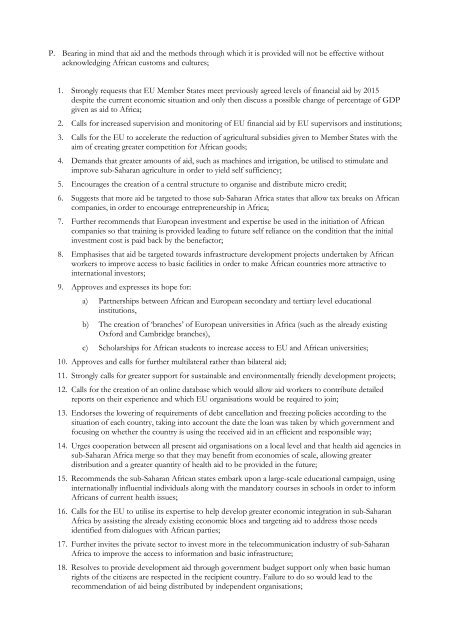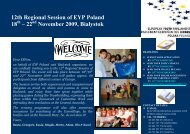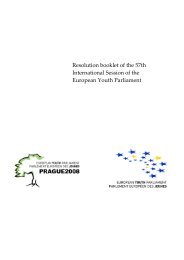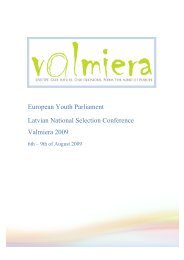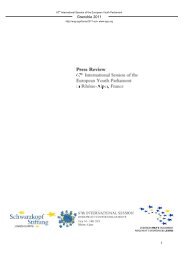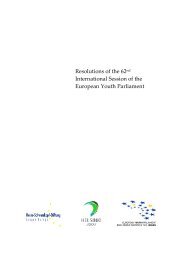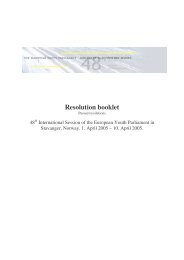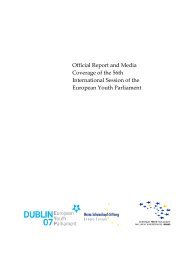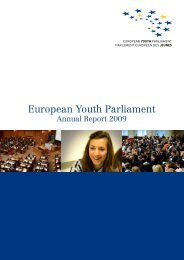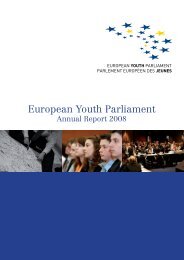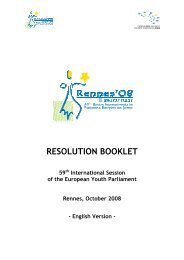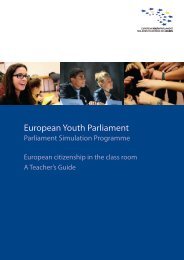Resolutions booklet in English - European Youth Parliament
Resolutions booklet in English - European Youth Parliament
Resolutions booklet in English - European Youth Parliament
Create successful ePaper yourself
Turn your PDF publications into a flip-book with our unique Google optimized e-Paper software.
P. Bear<strong>in</strong>g <strong>in</strong> m<strong>in</strong>d that aid and the methods through which it is provided will not be effective without<br />
acknowledg<strong>in</strong>g African customs and cultures;<br />
1. Strongly requests that EU Member States meet previously agreed levels of f<strong>in</strong>ancial aid by 2015<br />
despite the current economic situation and only then discuss a possible change of percentage of GDP<br />
given as aid to Africa;<br />
2. Calls for <strong>in</strong>creased supervision and monitor<strong>in</strong>g of EU f<strong>in</strong>ancial aid by EU supervisors and <strong>in</strong>stitutions;<br />
3. Calls for the EU to accelerate the reduction of agricultural subsidies given to Member States with the<br />
aim of creat<strong>in</strong>g greater competition for African goods;<br />
4. Demands that greater amounts of aid, such as mach<strong>in</strong>es and irrigation, be utilised to stimulate and<br />
improve sub-Saharan agriculture <strong>in</strong> order to yield self sufficiency;<br />
5. Encourages the creation of a central structure to organise and distribute micro credit;<br />
6. Suggests that more aid be targeted to those sub-Saharan Africa states that allow tax breaks on African<br />
companies, <strong>in</strong> order to encourage entrepreneurship <strong>in</strong> Africa;<br />
7. Further recommends that <strong>European</strong> <strong>in</strong>vestment and expertise be used <strong>in</strong> the <strong>in</strong>itiation of African<br />
companies so that tra<strong>in</strong><strong>in</strong>g is provided lead<strong>in</strong>g to future self reliance on the condition that the <strong>in</strong>itial<br />
<strong>in</strong>vestment cost is paid back by the benefactor;<br />
8. Emphasises that aid be targeted towards <strong>in</strong>frastructure development projects undertaken by African<br />
workers to improve access to basic facilities <strong>in</strong> order to make African countries more attractive to<br />
<strong>in</strong>ternational <strong>in</strong>vestors;<br />
9. Approves and expresses its hope for:<br />
a) Partnerships between African and <strong>European</strong> secondary and tertiary level educational<br />
<strong>in</strong>stitutions,<br />
b) The creation of ‘branches’ of <strong>European</strong> universities <strong>in</strong> Africa (such as the already exist<strong>in</strong>g<br />
Oxford and Cambridge branches),<br />
c) Scholarships for African students to <strong>in</strong>crease access to EU and African universities;<br />
10. Approves and calls for further multilateral rather than bilateral aid;<br />
11. Strongly calls for greater support for susta<strong>in</strong>able and environmentally friendly development projects;<br />
12. Calls for the creation of an onl<strong>in</strong>e database which would allow aid workers to contribute detailed<br />
reports on their experience and which EU organisations would be required to jo<strong>in</strong>;<br />
13. Endorses the lower<strong>in</strong>g of requirements of debt cancellation and freez<strong>in</strong>g policies accord<strong>in</strong>g to the<br />
situation of each country, tak<strong>in</strong>g <strong>in</strong>to account the date the loan was taken by which government and<br />
focus<strong>in</strong>g on whether the country is us<strong>in</strong>g the received aid <strong>in</strong> an efficient and responsible way;<br />
14. Urges cooperation between all present aid organisations on a local level and that health aid agencies <strong>in</strong><br />
sub-Saharan Africa merge so that they may benefit from economies of scale, allow<strong>in</strong>g greater<br />
distribution and a greater quantity of health aid to be provided <strong>in</strong> the future;<br />
15. Recommends the sub-Saharan African states embark upon a large-scale educational campaign, us<strong>in</strong>g<br />
<strong>in</strong>ternationally <strong>in</strong>fluential <strong>in</strong>dividuals along with the mandatory courses <strong>in</strong> schools <strong>in</strong> order to <strong>in</strong>form<br />
Africans of current health issues;<br />
16. Calls for the EU to utilise its expertise to help develop greater economic <strong>in</strong>tegration <strong>in</strong> sub-Saharan<br />
Africa by assist<strong>in</strong>g the already exist<strong>in</strong>g economic blocs and target<strong>in</strong>g aid to address those needs<br />
identified from dialogues with African parties;<br />
17. Further <strong>in</strong>vites the private sector to <strong>in</strong>vest more <strong>in</strong> the telecommunication <strong>in</strong>dustry of sub-Saharan<br />
Africa to improve the access to <strong>in</strong>formation and basic <strong>in</strong>frastructure;<br />
18. Resolves to provide development aid through government budget support only when basic human<br />
rights of the citizens are respected <strong>in</strong> the recipient country. Failure to do so would lead to the<br />
recommendation of aid be<strong>in</strong>g distributed by <strong>in</strong>dependent organisations;


